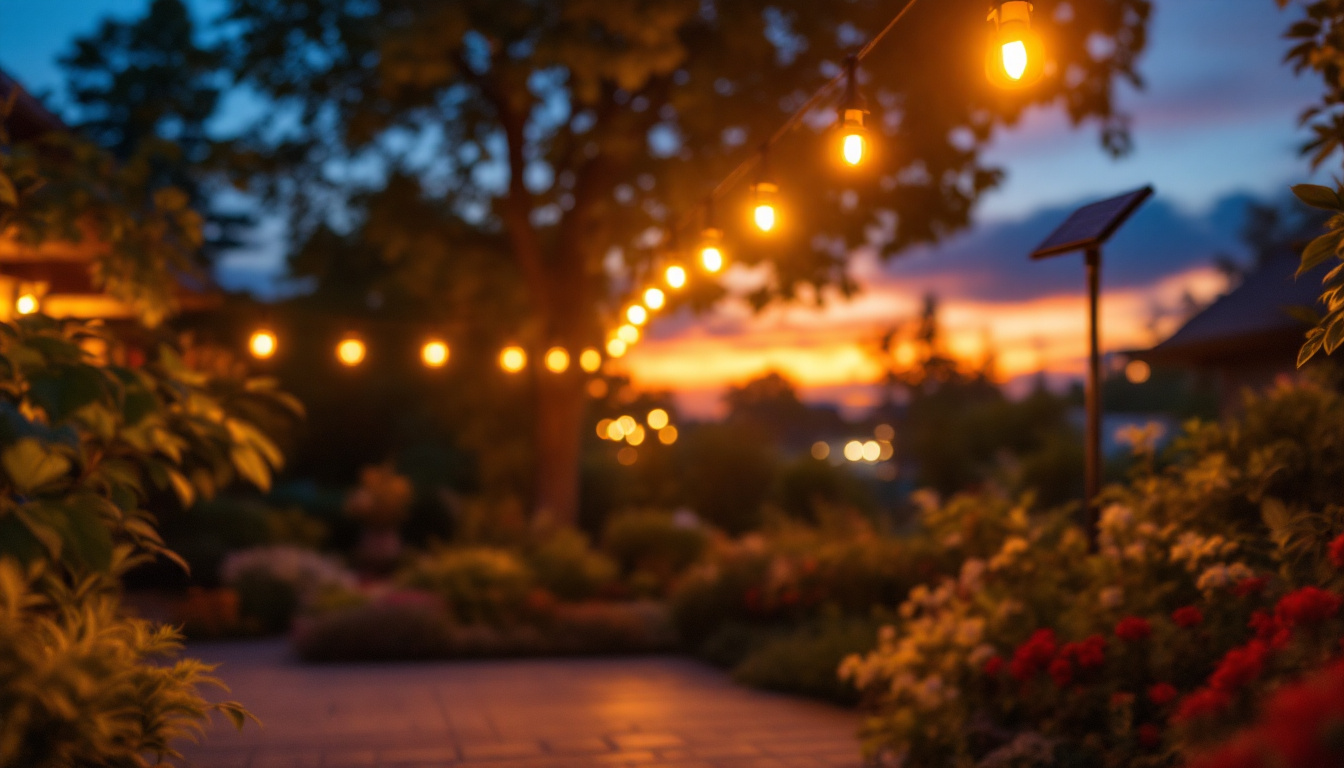
As the world shifts towards sustainable energy solutions, solar panel technology has emerged as a leading choice for outdoor lighting. This eco-friendly option not only reduces energy costs but also minimizes the carbon footprint associated with traditional lighting methods. For lighting contractors, understanding the intricacies of solar panels for outdoor lights is essential to meet the growing demand for energy-efficient solutions.
Solar panels convert sunlight into electricity, making them an ideal choice for outdoor applications where traditional power sources may be impractical. With advancements in technology, solar-powered outdoor lights have become more efficient, reliable, and versatile, catering to a variety of needs from residential to commercial settings.
One of the most significant benefits of solar panel technology is its ability to harness renewable energy, which is abundant and free. This not only helps in reducing electricity bills but also promotes energy independence. Homeowners and businesses alike can enjoy the flexibility of installing solar lights in remote areas without the need for extensive wiring or electrical infrastructure. Furthermore, many modern solar lights are equipped with motion sensors and timers, enhancing security and convenience while ensuring that energy is used efficiently.
In addition to their practical benefits, solar panels contribute to the aesthetic appeal of outdoor spaces. Available in various designs and styles, solar lights can complement landscaping and architectural features, creating an inviting atmosphere. From pathway lights that guide guests safely to outdoor sconces that illuminate patios, the versatility of solar lighting solutions allows for creative expression in outdoor design. As technology continues to evolve, we can expect even more innovative features, such as smart connectivity, enabling users to control their lighting systems remotely and integrate them with other smart home devices.
One of the most compelling reasons to consider solar-powered outdoor lights is their cost efficiency. Once installed, these systems require minimal maintenance and no electricity bills, leading to significant long-term savings. The initial investment in solar technology can be recouped over time, especially in areas with abundant sunlight.
Moreover, many jurisdictions offer incentives for solar installations, further reducing upfront costs. This financial advantage makes solar lighting an attractive option for both contractors and clients looking to enhance their outdoor spaces without breaking the bank. Additionally, the longevity of solar lights—often lasting up to 25 years—means that homeowners can enjoy years of illumination without the worry of frequent replacements, which is a common issue with traditional lighting systems.
Solar-powered outdoor lights contribute to a greener planet by harnessing renewable energy. Unlike traditional lighting systems that rely on fossil fuels, solar lights reduce greenhouse gas emissions and dependency on non-renewable resources. This aligns with global efforts to combat climate change and promotes a sustainable future.
For contractors, promoting solar lighting solutions can enhance their reputation as environmentally conscious professionals. Clients increasingly seek out businesses that prioritize sustainability, making solar installations a smart marketing strategy. Furthermore, the use of solar lighting can help in reducing light pollution, as many modern solar lights are designed to focus their illumination downward, minimizing their impact on nocturnal wildlife and preserving the natural night sky.
Solar outdoor lights come in a wide range of designs and functionalities, making them suitable for various applications. From pathway lights to security floodlights, the versatility of solar technology allows contractors to offer tailored solutions to meet specific client needs.
Additionally, advancements in solar technology have led to more aesthetically pleasing designs. Modern solar lights can blend seamlessly into outdoor environments, enhancing the overall appeal of properties while providing essential lighting. With options that include decorative lanterns, sleek modern fixtures, and even solar-powered string lights, homeowners can choose products that not only serve a practical purpose but also complement their outdoor décor. This variety allows for creative landscaping solutions that can transform a simple garden or patio into an inviting and enchanting space for gatherings and relaxation.
Pathway and landscape lighting are among the most popular applications for solar technology. These lights not only illuminate walkways and gardens but also enhance safety and security. With various styles available, contractors can select options that complement the landscape while providing functional lighting.
Many solar pathway lights feature motion sensors, allowing them to conserve energy by only activating when movement is detected. This feature not only prolongs battery life but also adds an extra layer of security to outdoor spaces.
Security and flood lights powered by solar energy are essential for enhancing safety in residential and commercial properties. These lights can illuminate large areas, deterring potential intruders while providing peace of mind for property owners.
Modern solar flood lights often come equipped with advanced features such as adjustable brightness settings and remote control capabilities. Such innovations allow contractors to customize lighting solutions based on client preferences and specific security needs.
Decorative solar lighting adds an aesthetic touch to outdoor spaces while serving functional purposes. Options like solar string lights, lanterns, and garden stakes can transform patios, decks, and gardens into inviting environments.
These decorative options are not only energy-efficient but also easy to install, making them a popular choice for homeowners looking to enhance their outdoor ambiance without extensive electrical work.
Before installation, a thorough site assessment is crucial. Contractors should evaluate the amount of sunlight the area receives throughout the day, as this directly impacts the performance of solar lights. Areas with significant shade from trees or buildings may require strategic placement or alternative solutions.
Additionally, understanding the specific needs and preferences of clients can guide the selection of appropriate solar lighting options. Factors such as desired brightness, duration of illumination, and aesthetic preferences should all be considered during the planning phase.
Proper mounting and positioning of solar lights are essential for optimal performance. Lights should be installed in locations that receive maximum sunlight exposure, typically on the south or west-facing sides of buildings or structures. This ensures that the solar panels can efficiently charge during the day, providing reliable illumination at night.
Contractors should also consider the height and angle of installation. For example, pathway lights may need to be installed at a lower height for effective illumination, while flood lights may require higher positioning to cover larger areas.
While solar lights are generally low maintenance, regular upkeep is necessary to ensure longevity and performance. Contractors should advise clients on the importance of keeping solar panels clean and free from debris, as dirt and grime can significantly reduce efficiency.
Battery replacement is another aspect of maintenance that should not be overlooked. Most solar lights use rechargeable batteries that may need to be replaced every few years, depending on usage and environmental conditions. Educating clients about these maintenance requirements can help them make informed decisions and prolong the life of their solar lighting systems.
Weather conditions can pose challenges for solar outdoor lights. In areas with prolonged cloudy or rainy seasons, the efficiency of solar panels may be compromised. However, advancements in solar technology have led to the development of more efficient panels that can still generate power in low-light conditions.
Contractors can mitigate these challenges by recommending solar lights with larger battery capacities or hybrid systems that combine solar and traditional power sources. This ensures that clients have reliable lighting even during adverse weather conditions.
While the initial costs of solar lighting systems may be higher than traditional options, the long-term savings often outweigh these upfront expenses. Contractors should be prepared to educate clients on the financial benefits of solar lighting, including reduced energy bills and potential tax incentives.
Providing a clear breakdown of costs and savings over time can help clients understand the value of investing in solar technology. Case studies or testimonials from previous clients can also be effective in illustrating the financial advantages of solar outdoor lights.
The future of solar outdoor lighting looks promising, with ongoing technological advancements paving the way for even more efficient and versatile solutions. Innovations such as smart solar lights that can be controlled via smartphone apps are becoming increasingly popular, allowing users to customize settings and monitor performance remotely.
Additionally, the integration of energy storage solutions is expected to enhance the reliability of solar lighting systems. This means that even during extended periods of low sunlight, clients can still enjoy consistent illumination.
As awareness of environmental issues continues to rise, the demand for solar-powered outdoor lighting is expected to grow. Lighting contractors who embrace this trend and expand their offerings to include solar solutions will be well-positioned to meet the needs of a changing market.
By staying informed about industry trends and advancements in solar technology, contractors can provide clients with the best possible solutions for their outdoor lighting needs, ensuring both satisfaction and sustainability.
Solar panels for outdoor lights represent a significant step towards energy-efficient lighting solutions. With numerous benefits, including cost savings, environmental impact, and versatility, solar lighting is becoming a preferred choice for many homeowners and businesses alike. For lighting contractors, understanding the intricacies of solar technology and its applications is essential to remain competitive in a rapidly evolving market.
By addressing installation considerations, maintenance requirements, and potential challenges, contractors can effectively guide clients in making informed decisions about solar outdoor lighting. As the industry continues to advance, embracing solar solutions will not only enhance service offerings but also contribute to a more sustainable future.
Ready to elevate your outdoor lighting projects with the efficiency and sustainability of solar technology? LumenWholesale is here to support you every step of the way. Our extensive selection of spec-grade lighting products ensures you have access to the highest quality solar lighting solutions at unbeatable wholesale prices. Say goodbye to middleman markups and hello to premium lighting with the convenience of free shipping on bulk orders. Make your next project shine brighter while maximizing value and convenience. Discover the perfect blend of quality and affordability at LumenWholesale – Wholesale Lighting at the Best Value.

Discover how Light Control Motion Sensors boost lighting efficiency and profitability.

Discover effective cost-saving strategies for lighting contractors with our comprehensive guide on 4 ft LED tube lights.

Discover the essential insights and advantages of using Set Light LED technology for lighting contractors.

Discover how waterproof cables enhance energy efficiency, reduce maintenance costs by 30%, and ensure reliable power in harsh environments. Learn more now!.